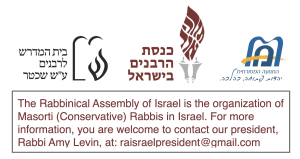
Among the fifty-three mitzvot in Parashat Mishpatim, two stand out: returning a lost animal and helping load and unload the burden on a beast. Two mitzvot that require us to help others. Who are those others whom we are bidden to help?
The Torah’s language is very clear: “Should you encounter your enemy’s ox or his donkey straying, you must surely return it to him. Should you see your adversary’s donkey sprawling under its load and would hold back from assisting him, you shall surely assist him.” (Ex 23:4–5)
“Your enemy … your adversary …” The requirement applies to animals belonging to your enemy and your adversary, not just those owned by your friends and relatives. Why was it necessary to specify that the straying ox is your enemy’s and that the donkey collapsing under its load belongs to our adversary?
It seems to me that the Torah seeks to emphasize that we have moral responsibilities toward the “other” regardless of that “other’s” behavior toward us. Unacceptable behavior by someone else does not justify improper behavior on our part.
In other words, the way our enemies treat us cannot be the yardstick by which we measure the way we treat them.
